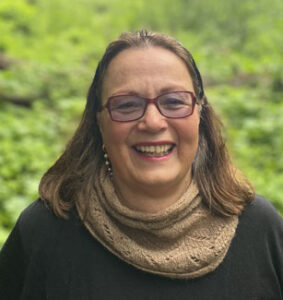Published in the Boston Globe, December 20, 2020
Few children recognize irony. Christmas Eve. Madonna Home. Unwed Mothers. It’s all there. But I didn’t see it until this very moment at the age of 70.
The most enduring Christmas tradition my family celebrated was Christmas Eve at the Madonna Home for Unwed Mothers. It began when my mother and sister and I climbed into the car—while my grandmother followed after a few minutes. For some reason, Santa always chose those few minutes to deliver our presents and he rang the jingle bells on the way out. We heard the bells from the car as we were waiting. Grandma would arrive at the car breathless with the encounter and we would be crestfallen again that we had missed him. You would think that we would not keep falling for this stratagem, but we did.
We drove through the dark to the country where the Mosebars lived in an enormous stone house with large balconies looking out over the fertile Yakima Valley in Washington state. They had turned their home into a place of refuge for Catholic girls who were pregnant and known as “unwed mothers” despite not having given birth yet. At that time, the stigma around unwed pregnancy and out-of-wedlock birth was enormous. Hidden away in the country, few visitors were allowed except for people like my mother, who was the girls’ social worker. Mr. and Mrs. Mosebar greeted us at the door and we were ushered into the living room where their current crop of unwed mothers waited—for us and ultimately for the births of their babies who would be adopted by Catholic families chosen by my mother’s agency, Catholic Family and Child Services. We never met the same ones twice. On a large table were the fruits of their labors: crocheted table runners, toilet roll covers, tiny tabletop doilies, dolls with huge skirts hiding another doll when turned over, doll clothes. Were there baby clothes? I don’t think so. The girls sat in overstuffed sofas and chairs, all covered with doilies of course, and they looked at us, and my sister Molly and I looked at them. Big girls and little girls: we had nothing and everything in common. Was there a sadness there? How could there not have been? I remember it being dark in that room. We didn’t stay there long, perhaps fifteen minutes. The real event was upstairs in another huge room that had been shut off from the rest of the house for a month. When Mrs. Mosebar opened the double doors, it was to a wonderland: a brightly lit Christmas tree that reached to the ceiling with branches spreading, to my young eyes, across the entire room. And underneath the beautifully decorated tree was an enormous pile of presents, perhaps hundreds of them. Once we had all assembled, bells would jingle, and Santa Claus would come through the doors from the balcony, his plump tummy rounded like all of the girls, his red velvet cap set at a jaunty angle and his pure white beard falling to his chest. We were all entranced. Then, exuding good will, he began handing out presents to all of us. I don’t even remember opening them, but we must have. I do remember receiving some crocheted items, like doll clothes. It made us happy. After he left, we ate cake and drank something sweet. As the time for Midnight Mass drew near, we gathered up coats and left, waving farewell to Mr. and Mrs. Mosebar. I suppose I never noticed what a plump tummy Mr. Mosebar had. He always wore farmers overalls while Mrs. Mosebar wore serviceable dresses and sturdy shoes and thick hose. They were kind.
We never saw the same girls again. They went back to their homes after their babies were born. Mr. and Mrs. Mosebar made sure they ate well and exercised and kept them busy knitting and crocheting. Having had two babies myself, I wonder now about their mental and emotional states both while pregnant and after. As kind as everyone was, they were all caught in a system where the girls had transgressed and they could not possibly keep their babies. Before Roe v. Wade, which legalized abortion in 1973, the girls had few options. They were all teenagers, just as the Virgin Mary was. No Joseph came forward to marry them. Their parents just wanted the problem to be taken care of. In some cases, the girls had been kicked out of their homes and had no place to go. But where were the boys, the fathers of the babies? Captaining the football team, graduating from high school, going to the prom. Feckless while the girls bore the brunt. Did I understand that then? No. But I did understand that those girls were being hidden away and weren’t with their families on Christmas Eve. And I think I sensed their shame. And their fear and dread of what was to come. And all of that was mixed into the celebration of a baby boy being born to a virgin who was not married when she became pregnant and who was not being forced to give him up.
Christmas Eve. Madonna Home. Unwed Mothers.
